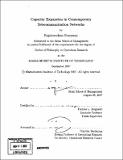Capacity expansion in contemporary telecommunication networks
Author(s)
Sivaraman, Raghavendran
DownloadFull printable version (7.613Mb)
Other Contributors
Massachusetts Institute of Technology. Operations Research Center.
Advisor
Thomas L. Magnanti.
Terms of use
Metadata
Show full item recordAbstract
We study three capacity expansion problems in contemporary long distance telecommunication networks. The first two problems, motivated by a major long distance provider, address capacity expansion in national hybrid long distance telecommunication networks that use both the traditional TDM technology and more recent VoIP technology to transport voice calls. While network capacity expansion in general is known to be hard to approximate, we exploit the unique requirements associated with hybrid networks to develop compact models and algorithms with strong performance guarantees for these problems. For a single period single facility capacity expansion problem in a hybrid network, using a decomposition approach we design a (2 + E)-factor approximation algorithm. Generalizing this idea, we propose a Decentralized Routing Scheme that can be used to design approximation algorithms for many variations of hybrid network capacity expansion. For the Survivable Capacity Expansion Problem in hybrid networks, in which we are required to install enough capacity to be able to support all demands even if a single link fails, we propose a compact integer program model. We show that this problem is APX-Hard, and present two heuristics with constant worst case performance guarantees. Finally, we consider the capacity planning problem when peak demands occurring at different times can share network capacity. We propose a general model for capturing time variation of demand, and establish a necessary and sufficient condition for a capacity plan to be feasible. Using a cutting plane approach, we develop a heuristic procedure. Computational experiments on real and random instances show that the proposed procedure performs well, producing solutions within 12% of optimality on average for the instances tested. The tests also highlight the significant savings potential that might be obtained by capacity planning with time sharing.
Description
Thesis (Ph. D.)--Massachusetts Institute of Technology, Sloan School of Management, Operations Research Center, 2007. Includes bibliographical references (p. 155-160).
Date issued
2007Department
Massachusetts Institute of Technology. Operations Research Center; Sloan School of ManagementPublisher
Massachusetts Institute of Technology
Keywords
Operations Research Center.